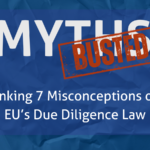
The state of nature continues to decline due to changes in land and sea use, overexploitation, harmful forestry practices, pollution, and climate change. Despite large societal support and clear evidence that restoring and protecting nature is crucial to halt biodiversity loss, combat climate change, and enhance human well-being, the Nature Restoration Law faced a political gridlock, which prevented it from being adopted sooner.
In the face of opposition from conservative groups, a provisional agreement was still reached in late 2023 and accepted by the European Parliament. However, COREPER I reneged on this agreement in March, causing a deadlock. Conversely, Austria broke the gridlock and allowed the legislation to be adopted. Improvements in the position of some regions combined with a bold maneuver of the Environmental Minister Leonore Gewessler, who did not wait for a legal internal green light and took the responsibility to overcome the impasse and casted the final support of the NRL sealing the deal.
This short analysis looks at the political gridlock and the three key Member States involved, Austria, Hungary and Poland. It seeks to understand why the Council could not maintain the political agreement and analyses Austria’s role in resolving the deadlock.
Read the full analysis here: Breaking the Gridlock: Overcoming Political Challenges to Restore Nature

